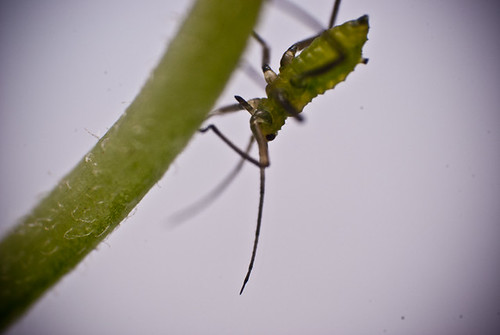
This Garden Vocabulary series seeks to introduce and explain to you — and in many cases, myself — words and terms associated with gardening. Please let me know if there are any terms you would like me to explore. You can leave your ideas in the comments section and we can learn together!
Parasite/Parasitism
“Parasitism is a non-mutual relationship between organisms of different species where one organism, the parasite, benefits at the expense of the other, the host. Traditionally parasite referred to organisms with lifestages that needed more than one host (e.g. Taenia solium). These are now called macroparasites (typically protozoa and helminths). Parasite now also refers to microparasites, which are typically smaller, such as viruses and bacteria, and can be directly transmitted between hosts of the same species.[1] Examples of parasites include the plants mistletoe and cuscuta, and organisms such as hookworms..” — Wikipedia.org
It is a rare garden that doesn’t host parasites. From the smallest aphid to the largest Japanese Beetle, gardeners can be caught between this bug and that, this parasitic plant and that (such as mistletoe or dodder often spotted here in the Souther California chaparral lands). The most important definition of a parasite or parasitism for me is the term “non-mutual.” Some insects, like bees do no harm to the plants, assist in pollination and gain nectar and pollen as their reward. Aphids, on the other hand, will literally suck the life out of your plants given enough time and population. The plant gains nothing and often loses as part of the aphids “relationship” with it.
In some cases, parasites can work in our favor. Various forms of parasitic wasps prey on aphids, catepillars and beetles and use them from the own ends. Just a reminder than not all parasites are bad to everyone in the same way.
With organic gardening and farming on the rise, the natural control of parasites is of on-going concern. Often this involves using a parasitic insect, like the wasps mentioned above, to control a more damaging plant parasite like aphids, tomato hornworm and others. With the proper application of the proper parasite at the proper time, farmers and gardeners can reduce crop damage without resorting the use of strong chemical controls.
Aphid Photo by Flickr User Antti J (Antti Jämsä)
More information on xeriscaping:
- Parasitism in the Garden from Arizona Cooperative Extension
- Parasitic Plants from Wikipedia
- Parasitic Plant Connection from Southern Illinois University
- Parasitic Wasps from National Gardening Association
- Parasitic beneficial insects to help your organic garden from Grow Organic
Previously on Garden Vocabulary:



